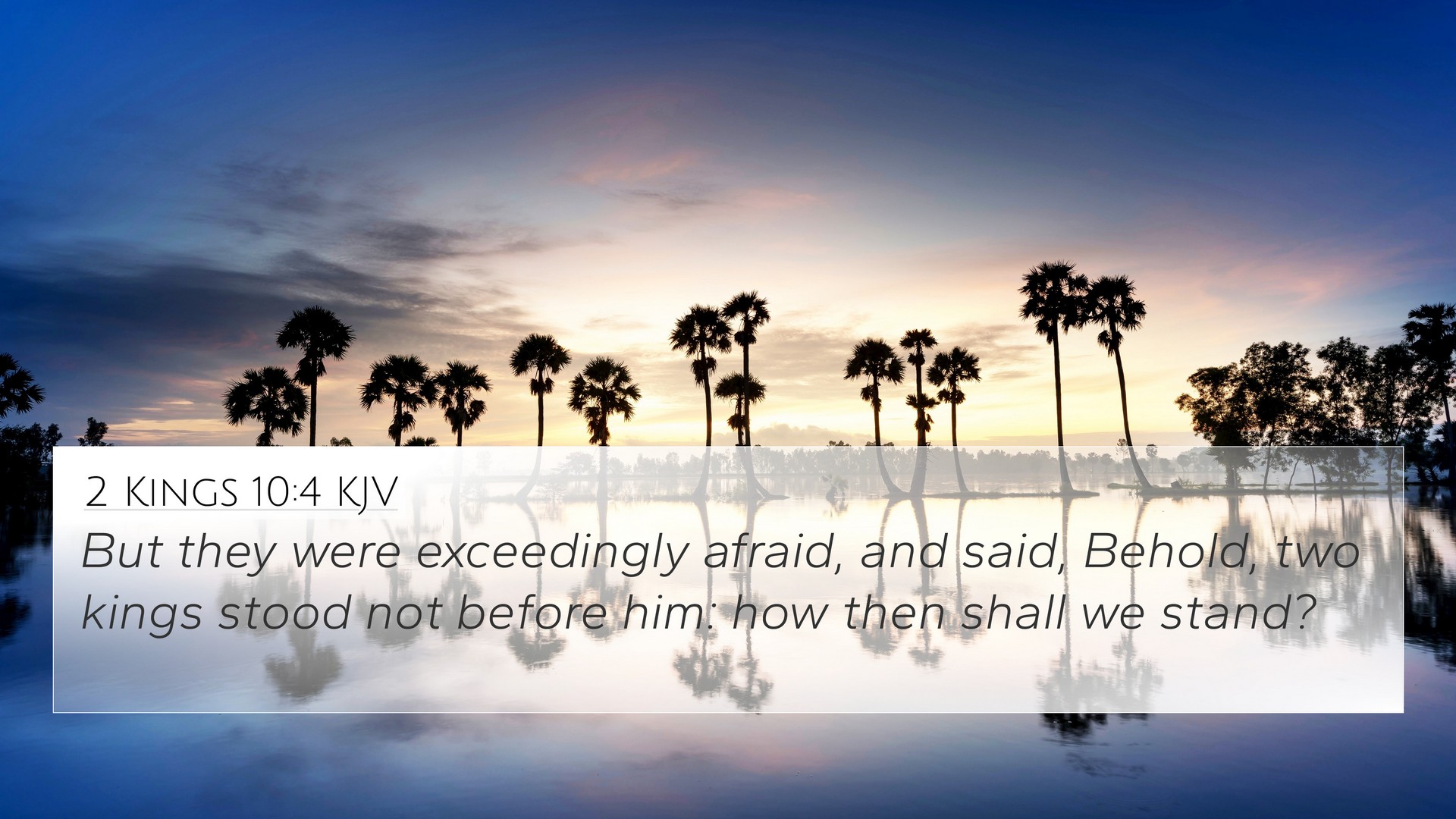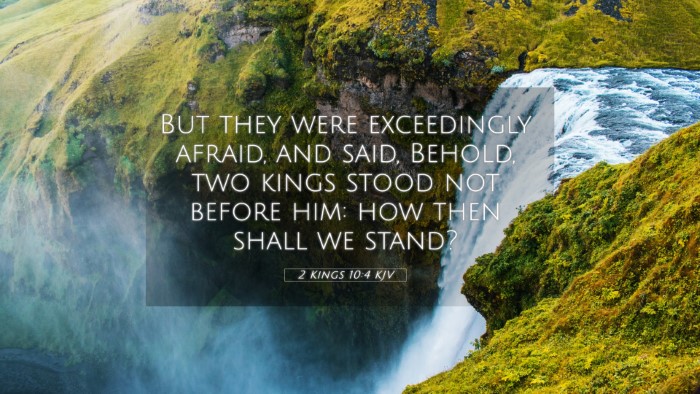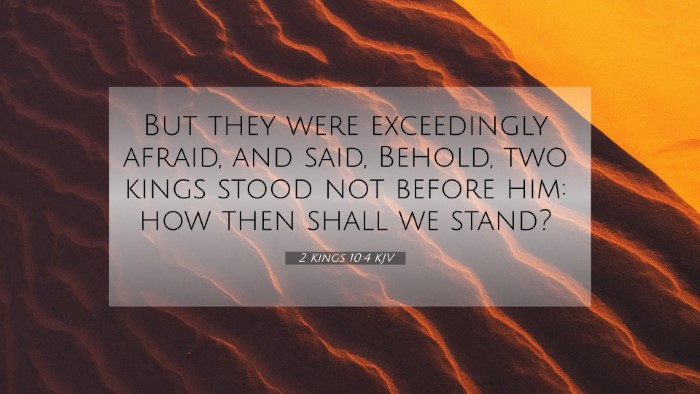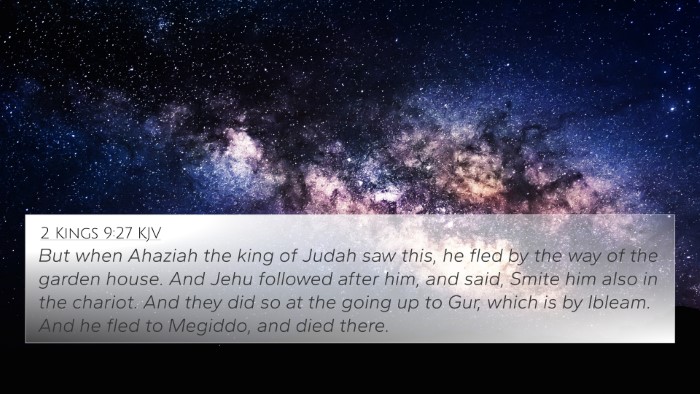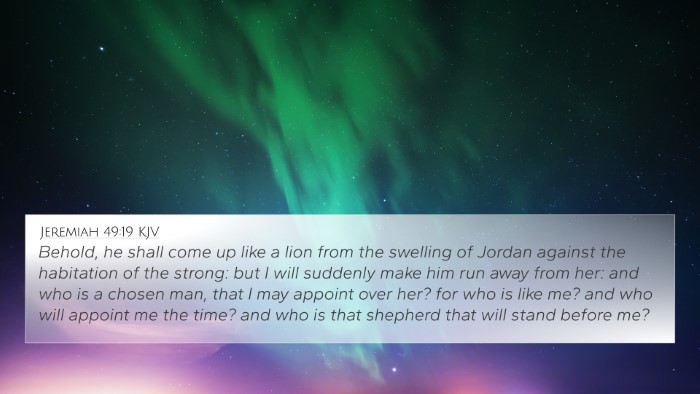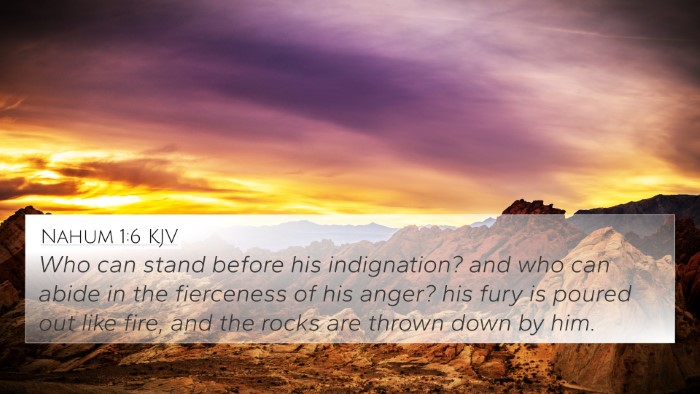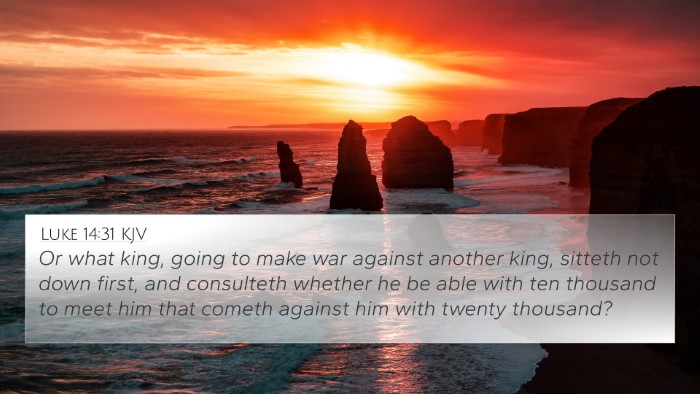Understanding 2 Kings 10:4
Bible Verse: 2 Kings 10:4
“But they were exceedingly afraid, and said, Behold, two kings stood not before him: how then shall we stand?”
Contextual Background
This verse occurs within a narrative concerning Jehu's rise to power and the demise of the house of Ahab. After Jehu was anointed king of Israel, he undertook a significant purge against the house of Ahab and the worshippers of Baal. The reaction of the messengers in this verse highlights the fear and trepidation that Jehu instilled in both the elite and common people of Israel.
Interpretation and Insights
- Fear of Authority: The mention of "two kings" indicates that those who opposed Jehu recognized the might of kings and military power.
- Historical Context: This fear may stem from Israel's previous experiences with kings and the potential for violent retribution, given Jehu's actions against Ahab's progeny.
- The Incompatibility of Evil: Their question, “how then shall we stand?” emphasizes the overarching theme of divine justice, as the wicked find themselves unable to contend with God's anointed.
- Implication of Divine Authority: The fear expressed also suggests a recognition of international and inter-kingdom conflicts, invoking a sense of divine sovereignty over the unfolding events.
Commentary Insights
Matthew Henry points out that the fear exhibited by the men was an acknowledgment of Jehu's zeal and its violent implications. He further notes that their fear was justified in light of prior revolutions where new rulers did not hesitate to eliminate any claimants to the throne.
Albert Barnes elaborates that the phrase reflects a sound understanding of the power dynamics involved and indicates a sense of hopelessness among those who opposed Jehu. They felt they had no standing against someone empowered by God.
Adam Clarke highlights the psychological aspect of leadership and governance, suggesting that fear can unify followers in trepidation and compel them to align with the ruling authority, even to the detriment of their faith and ethics.
Bible Cross-References
- 1 Kings 19:16-18: God's command to Elijah regarding the anointing of Jehu provides the contextual framework for Jehu's actions.
- 2 Kings 9:30-37: The fulfillment of prophecies regarding the death of Jezebel emphasizes the legitimacy of Jehu’s kingship.
- Exodus 15:11: This verse recalls God's victories and might, reinforcing the fear felt by enemies of God's anointed.
- Proverbs 21:1: This verse underscores the idea that the king's heart is in the hand of the Lord, manifesting His sovereignty in earthly matters.
- Jeremiah 25:8-9: This reference also highlights God's use of rulers as instruments of judgment against disobedience.
- Luke 14:31-32: The teachings of Jesus regarding kings in conflict bear similarity to the challenges faced by Jehu in solidifying his authority.
- Revelation 19:15: This portrays the ultimate divine authority, reminiscent of the power dynamics presented in 2 Kings.
Connections Between Bible Verses
The fear expressed in 2 Kings 10:4 has thematic connections with numerous other scriptures, suggesting a prevalent motif of divine authority in the face of earthly power:
- Thematic Elements: Both Isaiah 41:10 and Matthew 10:28 convey God’s assurance to His people against fears rooted in earthly governance and authority.
- Cross-Referencing with New Testament Teachings: Romans 13:1-2 demonstrates the New Testament continuity of respecting authority instituted by God, reconciling fear with reverence.
- Hebrews 10:31: This verse emphatically states, “It is a fearful thing to fall into the hands of the living God,” echoing the theme of divine judgment present in 2 Kings 10:4.
Tools for Bible Cross-Referencing
To comprehensively study the connections and implications of verses like 2 Kings 10:4, one can utilize:
- Bible Concordances: To find specific terms and themes across scriptures.
- Bible Cross-Reference Guides: To navigate thematic similarities and narrative parallels effectively.
- Cross-reference Bible Study Methods: Employing systematic approaches to study that highlight interrelationships.
Conclusion
2 Kings 10:4 encapsulates the profound fear of divine authority as witnessed through the actions and responses of those around Jehu. The cross-references to other Scriptures illuminate the continuity of biblical themes concerning authority, fear, and divine sovereignty. Through the use of effective tools for Bible study, a deeper understanding can be attained of how this verse connects with the greater narrative found within the Scriptures.
